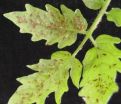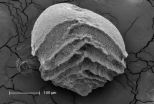(Press-News.org) RIVERSIDE, Calif. — Aphids are devastating insect pests and cause great losses to agriculture worldwide. These sap-feeding plant pests harbor in their body cavity bacteria, which are essential for the aphids' fecundity and survival. Buchnera, the bacterium, benefits also because it cannot grow outside the aphid. This mutually beneficial relationship is sabotaged, however, by the bacterium which proceeds to betray the aphid, a research team led by scientists at the University of California, Riverside has found.
"Although this betrayal is unintentional, it nevertheless alerts the plant about the aphid's presence and the aphids are unable to reproduce in large numbers," said Isgouhi Kaloshian, a professor of nematology, who led the research project. "A protein from the bacterium, found in the aphid saliva and likely delivered inside the plant host by the aphid, triggers plant immune responses against the aphid. It seems that the plant immune system targets the bacterium and exploits the strict mutual dependency between the plant and aphid to recognize the aphid as the intruder."
Study results appear online this week in the Proceedings of the National Academy of Sciences.
While feeding, aphids secrete saliva in the plant. To identify the protein composition of the aphid saliva, the researchers collected saliva from more than 100,000 aphids. Using mass spectrometry, they detected 105 proteins. They discovered these proteins were of both aphid and Buchnera origins. One of these Buchnera proteins, GroEL, was found to induce immune responses in plants.
"GroEL was known previously to trigger immunity in animals," said Kaloshian, a member of UC Riverside's Institute for Integrative Genome Biology. "However, our finding that it induces immunity in plants is new. Since most aphids harbor Buchnera, and likely have GroEL in their saliva, this bacterial protein may generally alert plants of the presence of aphids. How it is recognized by plants is still unknown. GroEL can now be exploited to engineer durable resistance of crops against aphids."
According to the researchers, since Buchnera-related bacteria are present in a number of insects (other than aphids), their findings are likely to be broadly applicable to other arthropods. GroEL and additional proteins from insect bacteria probably are delivered to plants through insect saliva and contribute to shaping plant-insect interactions.
"Strikingly, the majority of the aphid salivary proteins predicted for secretion were of unknown function and different from those typically secreted by microbes into plants," Kaloshian said. "However, these aphid salivary proteins, too, serve similar purposes in manipulating plant metabolism. Thus, aphids and microbes seem to have evolved different molecular solutions to achieve the same goals."
Currently, Kaloshian's lab is working on identifying the plant receptor for GroEL that initiates the plant immune response. Her team is also functionally characterizing the aphid salivary proteins with no known function to identify their roles.
"We would like to understand how these proteins are able to modulate host metabolism and identify their host targets," she said.
She was joined in the research by Ritu Chaudhary (first author of the research paper) and Hagop S. Atamian at UC Riverside; and Zhouxin Shen and Steven P. Briggs at UC San Diego. Shen and Briggs performed the mass spectrometry. The researchers used the model plant Arabidopsis in their experiments with the aphids.
INFORMATION:
The research was supported by a grant from the U.S. Department of Agriculture—National Institute of Food and Agriculture to Kaloshian and a grant from the National Science Foundation to Briggs.
The University of California, Riverside is a doctoral research university, a living laboratory for groundbreaking exploration of issues critical to Inland Southern California, the state and communities around the world. Reflecting California's diverse culture, UCR's enrollment has exceeded 21,000 students. The campus opened a medical school in 2013 and has reached the heart of the Coachella Valley by way of the UCR Palm Desert Center. The campus has an annual statewide economic impact of more than $1 billion. A broadcast studio with fiber cable to the AT&T Hollywood hub is available for live or taped interviews. UCR also has ISDN for radio interviews. To learn more, call (951) UCR-NEWS.
The betrayal of the aphids
UC Riverside-led research team shows how a bacterial protein in aphid saliva triggers plant defense against aphids
2014-06-02
ELSE PRESS RELEASES FROM THIS DATE:
First survey of ACOs reveals surprising level of physician leadership
2014-06-02
LEBANON, NH (June 2, 2014) – In spite of early concerns that hospitals' economic strengths would lead them to dominate the formation of Accountable Care Organizations (ACOs), a new study published in the June issue of Health Affairs reveals the central role of physician leadership in the first wave of ACOs.
"The broad reach of physician leadership in ACOs has important implications for the future of health care reform", said Carrie Colla, PhD, lead investigator of the study. "A central role for physicians in the leadership of ACOs is likely to have a powerful influence ...
Decomposing logs show local factors undervalued in climate change predictions
2014-06-02
A new Yale-led study challenges the long-held assumption that climate is the primary driver of how quickly organic matter decomposes in different regions, a key piece of information used in formulating climate models.
In a long-term analysis conducted across several sites in the eastern United States, a team of researchers found that local factors — from levels of fungal colonization to the specific physical locations of the wood — play a far greater role than climate in wood decomposition rates and the subsequent impacts on regional carbon cycling.
Because decomposition ...
Resveratrol supplements cause pancreatic problems in developing fetus
2014-06-02
PORTLAND, Ore. — A widely available dietary supplement that had been considered safe — and that some claim provides anti-aging and other health benefits — caused significant developmental abnormalities in the pancreas of offspring of pregnant monkeys who were given the supplement, according to a study published today in the FASEB Journal, from the Federation of American Societies of Experimental Biology.
Because of the results, authors of the study strongly recommend that pregnant women or women who might get pregnant avoid taking the supplement.
The supplement contains ...
JCI online ahead of print table of contents for June 2, 2014
2014-06-02
Mucin concentration contributes to a sticky situation in cystic fibrosis
Patients with cystic fibrosis (CF) accumulate thick, sticky mucus in the lungs that clogs the airways and leads to life-threatening lung infections. It has recently been proposed that differing concentrations of mucin with in mucus layers of the CF lung contribute to decreased mucus clearance; however, it has been challenging to accurately access mucin concentration. In this issue of the Journal of Clinical Investigation, Mehmet Kesimer and colleagues at the University of North Carolina applied size ...
Modern ocean acidification is outpacing ancient upheaval, study suggests
2014-06-02
Some 56 million years ago, a massive pulse of carbon dioxide into the atmosphere sent global temperatures soaring. In the oceans, carbonate sediments dissolved, some organisms went extinct and others evolved.
Scientists have long suspected that ocean acidification played a part in the crisis—similar to today, as manmade CO2 combines with seawater to change its chemistry. Now, for the first time, scientists have quantified the extent of surface acidification from those ancient days, and the news is not good: the oceans are on track to acidify at least as much as they did ...
Study: Hurricanes with female names more deadly than male-named storms
2014-06-02
In the coming Atlantic hurricane season, watch out for hurricanes with benign-sounding names like Dolly, Fay or Hanna. According to a new article from a team of researchers at the University of Illinois, hurricanes with feminine names are likely to cause significantly more deaths than hurricanes with masculine names, apparently because storms with feminine names are perceived as less threatening.
An analysis of more than six decades of death rates from U.S. hurricanes shows that severe hurricanes with a more feminine name result in a greater death toll, simply because ...
ASU researcher leads national effort to transform undergraduate biology education
2014-06-02
TEMPE, Ariz. — During the past few decades, the field of biology has dramatically expanded, incorporating many diverse sub-disciplines and specialty areas such as microbiology and evolutionary biology. However, teaching biology to undergraduate students has not kept pace with the changes, and core biology curriculum varies widely from university to university, and classroom to classroom.
In an effort to both capture the diversity of biology and condense what is taught, an Arizona State University researcher is leading a grassroots effort to improve biology education throughout ...
New UGA research engineers microbes for the direct conversion of biomass to fuel
2014-06-02
Athens, Ga. – The promise of affordable transportation fuels from biomass—a sustainable, carbon neutral route to American energy independence—has been left perpetually on hold by the economics of the conversion process. New research from the University of Georgia has overcome this hurdle allowing the direct conversion of switchgrass to fuel.
The study, published in the Proceedings of the National Academy of Sciences, documents the direct conversion of biomass to biofuel without pre-treatment, using the engineered bacterium Caldicellulosiruptor bescii.
Pre-treatment ...
Tracking potato famine pathogen to its home may aid $6 billion global fight
2014-06-02
CORVALLIS, Ore. – The cause of potato late blight and the Great Irish Famine of the 1840s has been tracked to a pretty, alpine valley in central Mexico, which is ringed by mountains and now known to be the ancestral home of one of the most costly and deadly plant diseases in human history.
Research published today in the Proceedings of the National Academy of Sciences, by researchers from Oregon State University, the USDA Agricultural Research Service and five other institutions, concludes that Phytophthora infestans originated in this valley and co-evolved with potatoes ...
Tumor size is defining factor to response from promising melanoma drug
2014-06-02
CHICAGO — In examining why some advanced melanoma patients respond so well to the experimental immunotherapy MK-3475, while others have a less robust response, researchers at Mayo Clinic in Florida found that the size of tumors before treatment was the strongest variable.
MULTIMEDIA ALERT: Video and audio are available for download on the Mayo Clinic News Network.
They say their findings, being presented June 2 at the 50th annual meeting of the American Society of Clinical Oncology (ASCO), offered several clinical insights that could lead to different treatment strategies ...
LAST 30 PRESS RELEASES:
Jeonbuk National University researchers develop an innovative prussian-blue based electrode for effective and efficient cesium removal
Self-organization of cell-sized chiral rotating actin rings driven by a chiral myosin
Report: US history polarizes generations, but has potential to unite
Tiny bubbles, big breakthrough: Cracking cancer’s “fortress”
A biological material that becomes stronger when wet could replace plastics
Glacial feast: Seals caught closer to glaciers had fuller stomachs
Get the picture? High-tech, low-cost lens focuses on global consumer markets
Antimicrobial resistance in foodborne bacteria remains a public health concern in Europe
Safer batteries for storing energy at massive scale
How can you rescue a “kidnapped” robot? A new AI system helps the robot regain its sense of location in dynamic, ever-changing environments
Brainwaves of mothers and children synchronize when playing together – even in an acquired language
A holiday to better recovery
Cal Poly’s fifth Climate Solutions Now conference to take place Feb. 23-27
Mask-wearing during COVID-19 linked to reduced air pollution–triggered heart attack risk in Japan
Achieving cross-coupling reactions of fatty amide reduction radicals via iridium-photorelay catalysis and other strategies
Shorter may be sweeter: Study finds 15-second health ads can curb junk food cravings
Family relationships identified in Stone Age graves on Gotland
Effectiveness of exercise to ease osteoarthritis symptoms likely minimal and transient
Cost of copper must rise double to meet basic copper needs
A gel for wounds that won’t heal
Iron, carbon, and the art of toxic cleanup
Organic soil amendments work together to help sandy soils hold water longer, study finds
Hidden carbon in mangrove soils may play a larger role in climate regulation than previously thought
Weight-loss wonder pills prompt scrutiny of key ingredient
Nonprofit leader Diane Dodge to receive 2026 Penn Nursing Renfield Foundation Award for Global Women’s Health
Maternal smoking during pregnancy may be linked to higher blood pressure in children, NIH study finds
New Lund model aims to shorten the path to life-saving cell and gene therapies
Researchers create ultra-stretchable, liquid-repellent materials via laser ablation
Combining AI with OCT shows potential for detecting lipid-rich plaques in coronary arteries
SeaCast revolutionizes Mediterranean Sea forecasting with AI-powered speed and accuracy
[Press-News.org] The betrayal of the aphidsUC Riverside-led research team shows how a bacterial protein in aphid saliva triggers plant defense against aphids






